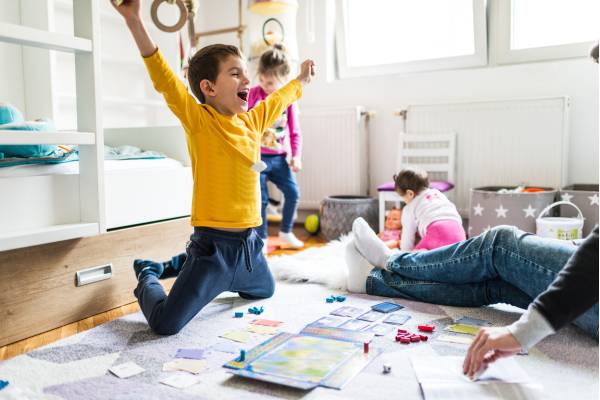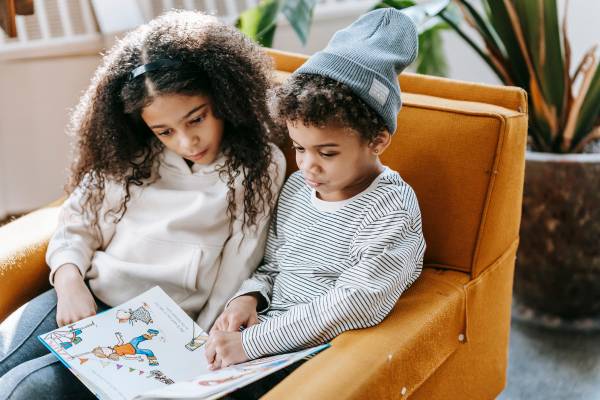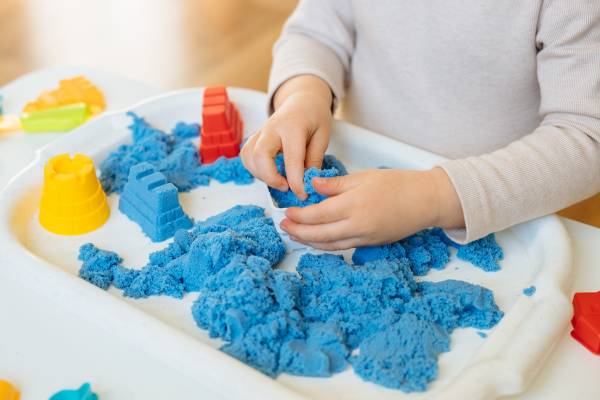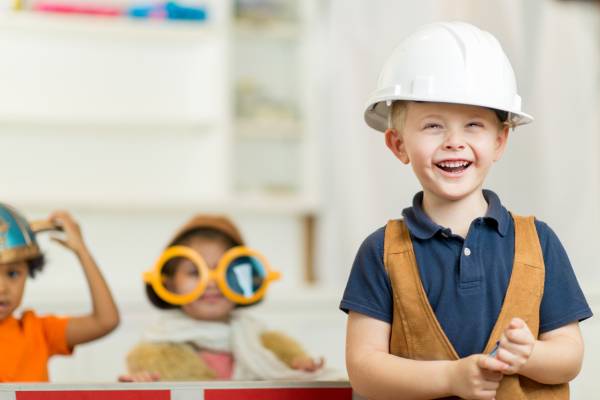Children learn and make sense of the world around them through play. While they are having fun, they are developing their cognitive, physical, social and emotional skills. But play is also key in building your child’s mental health and is a great way to relieve stress. Our bodies release endorphins when we have fun, promoting a feeling of well-being. The right toys can play a vital role in supporting children’s emotional development and mental health. Here we explain how different toys that help foster positive mental and emotional health;
Creative toys and activities, such as Jar Melo Rock Painting and Aquabeads Beginners Studio, provide children with a creative outlet. Being creative allows children to express their thoughts, emotions and experiences visually. When they engage in activities such as painting, drawing or collage, they can communicate and process their feelings in a nonverbal and symbolic way. This form of expression can be especially beneficial for children who struggle to articulate their emotions verbally. Creating art also provides children with a focused and absorbing activity that allows them to be fully engaged and present in the moment. This can help them to temporarily detach from their anxieties or negative thoughts, and helps them to relax. Children are also free to experiment with different colours, textures, and materials to represent their emotions, helping them gain a deeper understanding of their feelings and experiences.

Board games, such as Snakes & Ladders and Ludo, and The Logo Board Game, provide opportunities for children to connect with others and develop their social skills. Whether playing with family members or friends, children will learn important skills such as taking turns and playing by the rules which teaches empathy, cooperation, and communication skills. Additionally, playing games like these offers an enjoyable and engaging way to divert attention from any worries or anxieties a child may have. While playing, children need to be focused and concentrate - a great way to just ‘be in the moment’.
Outdoor games and activities, such as the Seekers Scavenger Hunt Starter Kit and Swingball have numerous benefits for children’s mental health. Being outside encourages physical exercise which releases endorphins, neurotransmitters that boost mood and reduce feelings of stress and anxiety. When children participate in regular physical activities such as sport, tag, or riding a bike, this not only improves their cardiovascular health but also enhances concentration, improves sleep patterns and boosts self-esteem, all of which contribute to better mental well-being.
Being outside also gives children an opportunity to connect with nature. Spending time surrounded by nature has been linked to reduced stress, increased relaxation and improved mental clarity. In an outdoor environment children often enjoy imaginative play and exploration, and learn to appreciate the beauty of their surroundings. This can be particularly helpful for children with attention deficit hyperactivity disorder (ADHD) as they experience a sense of calmness and feel connected to the natural world. Outdoor games and activities often involve a lot of social interaction and the opportunity for children to learn about teamwork, cooperation and communication. This will help them learn how to form healthy relationships and will build their social confidence.
Books and storytelling games, such as Rory's Story Cubes, provide a safe space for children to explore and process their emotions. Through relatable stories and characters, children can identify and understand their own feelings. This process of identification and reflection helps children to develop self-awareness, coping mechanisms and resilience.

As children are read to, or read themselves, they can immerse themselves in the story and understand characters’ perspectives which helps them to learn empathy, recognise emotions and navigate complex social situations as they arise in real life. They gain a deeper understanding of human emotions and relationships which translates into better interpersonal skills.
Stories are a great way to relax and escape from life’s stress for a while, and encouraging reading and storytelling as part of your child’s routine can have long-lasting benefits for their mental health and well-being.
Emotional expression toys are toys such as My First Emotions and Big Feelings Pineapple, that help children to recognise and express their emotions in a safe and interactive way.
Toys such as soft animals and dolls can be a source of comfort and companionship for children, and are often trusted confidants that children feel safe sharing their thoughts and feelings with. Children will also use these toys to act out scenarios, experimenting with different emotions and problem solving strategies, helping them to develop emotional intelligence in a way they feel comfortable with.
Children may find it difficult to articulate their emotions verbally, particularly if they are young or have limited language skills, so toys such as puppets and action figures allow children to demonstrate their emotions through play, gestures or interactions with the toy. This nonverbal communication can help children feel understood, encourage dialogue with caregivers, and help them to learn how to express themselves effectively.
Sensory toys, such as the Playfoam Sand Sensory Set gives children the opportunity to explore different textures, sounds, scents, colours, and tastes through play. As children play with sensory toys, they are focusing on the senses which is a form of mindfulness, similar to paying attention to the breath when meditating. Children tend to get very absorbed in sensory play because they’re in tune with what is happening in the present moment, rather than multitasking or letting their minds wander. Activities like playing with sand, water or playdough can have a grounding effect, helping children to relax and alleviate stress and anxiety, and the repetitive and rhythmic nature of some types of sensory play can be comforting to children, helping them to feel secure. Soft toys like Warmies can be particularly beneficial at times when children need to relax, for example, at bedtime. They are tactile, slightly weighted, scented with lavender and can be warmed in the microwave, providing a soothing and calming effect.

Mindfulness toys, such as the Magformers Spin Plus Set and Twiddle offer children a soothing outlet to relieve stress. Stress balls and fidget spinners are other examples of toys that can provide a sense of calm and can help children to regulate their emotions. Children with ADHD may find such toys particularly beneficial. These children can experience sensory over or under stimulation, and toys they can squeeze, spin and manipulate with their hands help them to regulate their bodies and improve their focus and attention.
Roleplay
When children are dealing with complex emotional issues, it can often be seen in their play, such as acting out a real-life situation they have experienced. Giving children space to explore different scenarios in this way allows them to work through feelings such as fear or loss, giving them a way to express things they are struggling with that they don’t yet have the words to fully explain. For example, if your child has witnessed an argument, they may recreate this conflict with their dolls.

Playing dress-up is a form of play that can be extremely beneficial for children’s emotional health and growth. Children are learning the social and emotional skills they need to operate in different settings, such as in the classroom, at home, with friends, and dressing up gives them a chance to practise. Putting on a costume allows children to test-drive new ways of thinking, behaving and interacting with others. ‘Real life’ costumes, like a doctor's outfit, and play-sets like Examine & Treat Pet Vet Play Set, allows them to explore their interests, emulate adults in their life, and develop a sense of responsibility. Being a superhero helps to build self-esteem and confidence, and even being the ‘baddie’ allows children to experience feeling power and let out aggressive energy in a safe and playful way.
Related Product
Recent Blogs
Recent Blogs

General
McHALE DESIGN CASE STUDY: MONSTERVERSE- THE LEGEND CONTINUES…

General
Build-A-Bear Celebrates National Teddy Bear Day with Donation to The Toy Foundation™

Industry Commentary, Op-Ed
Toy Foundation Auction is Now Open for Your Bids

Industry Commentary, Op-Ed
Bracelets, Stickers, and Viral Fame: The Story Behind Sky Castle Toys’ Sticki Rolls

Biographies and Interviews
Chrissy Fagerholt: Luck is when Preparation Meets Opportunity!
See more
Recent Wiki

BOOK REVIEWS
Book Review: Storm: Dawn of a Goddess by Tiffany D. Jackson

BOOK REVIEWS
Book Review: Erno Rubik and his Magic Cube by Kerry Aradhya

BOOK REVIEWS
Game Review: Trip Chaser

COMPANIES
Learning Express Toys Hosts 25th Annual Convention & Toy Expo at JW Marriott Tucson

MISCELLANEOUS
Submit Your LA Showroom Details for 2025 Toy Previews
See more
POP's Got Talent

POP Entertainment
Randy Klimpert Shares his Ukulele Collection

POP Entertainment
Steve Casino Peanut Art

POP Entertainment
Everyone's Talking about POP!

POP Entertainment
Princess Etch - a Multi-Talented Etch A Sketch Artist

POP Entertainment
Joseph Herscher of Joseph' s Machines.
See more
Recent POPcast

Hidden Role: The Brains Behind your Favorite Games
Connie Vogelmann designed Apiary & Wyrmspan!

Hidden Role: The Brains Behind your Favorite Games
Bob Fuhrer... Is THE Crocodile Dentist!

Hidden Role: The Brains Behind your Favorite Games
Tom Dusenberry... Bought Atari, Wizards of the Coast, and Avalon Hill!

Hidden Role: The Brains Behind your Favorite Games
Matt Leacock created Pandemic... the game!

Hidden Role: The Brains Behind your Favorite Games
Scott Brown and Tim Swindle... are Launching a New Sport!
See more
POPDuos

POPDuos: Interviews with Legends and Leaders
POPDuo: Richard Dickson, Mattel’s President & COO, and Kedar Narayan, Young Inventor Challenge AMB

POPDuos: Interviews with Legends and Leaders
POPDuo: Will Shortz and Josh Wardle

POPDuos: Legends and Leaders Explore Creativity
POP Duo: Elan Lee, Co-Founder, Exploding Kittens.and Jeff Probst, Host and Exec Producer, Survivor

POPDuos: Legends and Leaders Explore Creativity
POP Duo: David Fuhrer, MNG Director, Blue Sq Innovations & Shawn Green, past Dodgers & Mets MLB Star

POPDuos: Legends and Leaders Explore Creativity
POP Duo: Bob Fuhrer, Founder, Nextoy and Tom Fazio, Golf Course Designer
See more













